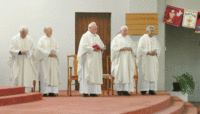17 August 2011
Fr Michael McCabe gave this homily at a jubilee Mass on July 19 for the five jubilarians pictured below.
When I told our principal celebrant [Fr Frank Whitaker] recently that I was preparing the homily for this Mass of Jubilee he uttered a simple and heartfelt prayer, ‘Oh God!’ And when I tried to reassure him that this would not be a eulogy Frank replied, ‘No, of course not – life is changed not ended!’
 Frank’s self-deprecating humour is a quality that all of our jubilarians have crafted over the years: Pat Greally, Bryan Montgomery, Petelo Mauga, Fred Bliss and Edmund Little [as has Colin Karalus who celebrates 55 years of priesthood this Saturday]. I shall leave it to Gerard Burns to develop this theme in his toast to the jubilarians.
Frank’s self-deprecating humour is a quality that all of our jubilarians have crafted over the years: Pat Greally, Bryan Montgomery, Petelo Mauga, Fred Bliss and Edmund Little [as has Colin Karalus who celebrates 55 years of priesthood this Saturday]. I shall leave it to Gerard Burns to develop this theme in his toast to the jubilarians.
My brief is the gospel and in particular a gospel passage [John 21:15-17] that has been their life-long brief: ‘To feed the sheep’. We know this resurrection narrative so well. It begins with a fishing trip gone-badly-all-night, but one whose fortunes change just as quickly when Jesus himself suggests that the disciples try a different approach.
And then there is the meal – a ‘clergy dinner’ laid on by the master himself – and that wonderful and life-changing invitation: ‘Come and have breakfast!’
We would be excused if we thought that the context should be one of reproof but Jesus overlooks Peter’s Friday failure of nerve and instead offers a simple invitation, ‘Come and have breakfast…’ – a breakfast of reconciliation, understanding and acceptance.
What Peter may well have thought of as an ending, at least before the breakfast, was for him, and for ourselves in this local Church of Wellington, a new start.
• To be forgiven
• To be trusted
• To be welcomed home
• To be called by name, and,
• To belong at the table
These are deeply cherished human needs which, in turn, and over time, become the foundations of ministry. Inevitably, or is it inexorably, these deeply-felt human needs lead us into a much deeper context of faith. They lead us into the heart of God’s call to Peter which he receives on our behalf: ‘Come and have breakfast’. It is an invitation that opens our hearts to another question, ‘Do you love me?’
And, in truth, this question takes us all a lifetime to answer.
Like Peter, what we often think are endings frequently turn out to be new beginnings and experience tells us that the converse is also true. Some new beginnings are proven over time to be endings by another name. That is why the answer to the Lord’s question took Peter a lifetime of faith to answer. It is this lifetime response of faith that we also honour in our jubilarians today.
In many respects the context for your ordination in 1961 was an ending, not a beginning. Unwittingly your seminary formation left you unprepared and ill-equipped for the paradigm shift that was to occur so early in your priesthood. The Second Vatican Council [1962-1965] was to usher in a new way of thinking about Church and ministry – both lay-ecclesial ministry and the ordained priesthood. It was a new way of thinking about our baptism into Christ and a fresh way of thinking about, and living out, our unique call and response in Christ.
It has been said that it will take six generations, some 100 years for the reforms of Vatican II to come to full flowering. Surely this frequently overlooked fact underscores the depth and quality of your priestly ministries.
By your fidelity over the long haul, and by your courage and faith, you have each helped to create a path of hope for the Body of Christ in Wellington and beyond.
Those of us who minister alongside you offer our prayerful and sincere gratitude to God for the gift you have been and are.
Please God, those who follow our own modest efforts will also one day learn of the courage and faith that it has taken you, individually and collectively, to build this path of hope, this wonderful legacy of grace.
Image: Golden Jubilarians 2011: Frs Pat Greally, Bryan Montgomery SM, Frank Whitaker, Fred Bliss SM and Petelo Mauga.